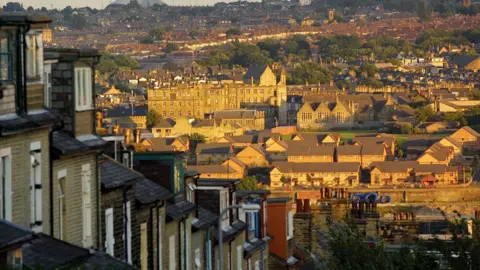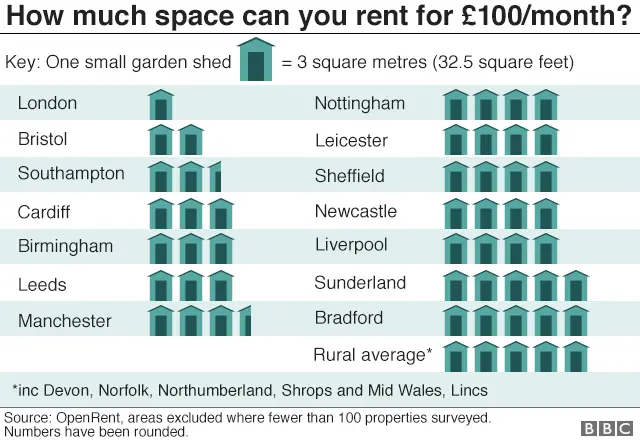Renting a home: How much space will £100 buy you?
 Getty Images
Getty ImagesSpending £100 a month on rent in London secures floor space equivalent to a small garden shed, compared with nearly five times that in parts of northern England, new research shows.
Data released to BBC News shows cheaper properties to rent in the capital "simply don't exist", letting agents said.
Agents said people were compromising on where they live to make ends meet.
The government said it was increasing spending on affordable housing.

Data from 20 areas of England and Wales relating to two-bedroom houses and flats advertised on OpenRent, and shared with BBC News, reveals:
- Each £100 of rent for a two-bed home in central London gets about 3.91 sq m, smaller than the average three-person tent
- Bradford is the city where £100 rents the biggest floor area in a two-bed home - 14.83 sq m
- Outside London, Oxford (5.03 sq m per £100 a month) and Bristol (6.98 sq m per £100 a month) were the most expensive places in the sample
- The average two-bed home in rural Lincolnshire is £200 a month, compared with £1,691 a month in London
Types of property for rent also vary in size. The average London one-bed flat for rent measures 51 sq m, according to the data. By contrast, in rural Shropshire and mid Wales, the average is 77 sq m.
The amount of space you get for your rent is reflected in the space you get for your money when buying. The Office for National Statistics said 1 sq m of floor space - about the size of a red phone box - costs £19,439 in Kensington and Chelsea, while in Blaenau Gwent the same amount of space costs £777.

'A room with a sink and a microwave'
 Ed Stennett
Ed StennettFor Ed Stennett £1,000 a month, almost twice the national average rent, should have been plenty.
Yet when the app designer moved to central London from Winchester he struggled to find anywhere bigger than a one-room flat for his money.
"Winchester is an expensive place, but even there your money goes further," he said.
"When I was looking in London, £1,000 would get me a studio.
"For some of those it was little more than a room with a sink, a kettle and a microwave.
"Some of the nicer ones might have had space for a double bed, but nothing you'd call a living space. There wouldn't be room for a sofa or a TV."
The 22-year-old said a friend had got a job in London at the same time and the two were able to rent a two-bedroom flat in Bow.
That costs £1,640 a month between them. The national average rent for a property in England and Wales is £926.

Sam Hurst, spokesman for OpenRent, said: "Despite cities like Oxford, Bristol and London being hugely expensive in terms of monthly rents, the properties afforded by those high rents are by no means luxury.
"Having enough room in our homes is very important to our wellbeing, but renters in the south of England are paying a huge premium for it.
"The result is that many in London are compromising on location or who they live with, just to make ends meet.
"Young families who can't afford to buy are in a tough position, since to find the space they need for their growing families, they are forced to move cities.
"Simply looking for smaller properties isn't a solution for renters in the South, either. Those properties simply don't exist."
'Control rents'
Seb Klier, policy and campaigns manager for campaign group Generation Rent, said: "The huge difference in rents around the country lays bare the failure to build enough homes in those areas that have the largest jobs markets.
"It may be much cheaper to rent in Shropshire or Northumberland than in London, Oxford and Bristol, but people are moving to these cities for work and need homes that are affordable.
"To fix this we need much greater ambition from politicians to build homes where they're needed, along with powers to control rents where demand is highest."
A spokesman for the Department for Communities and Local Government said: "We are fixing our broken housing market and making the rental sector fairer and more transparent. Overall rents are now increasing at a lower level than inflation.
"But we're determined to do more and that's why we have increased the affordable housing budget to more than £9bn and introduced measures to boost the delivery of properties.
"We're also delivering on our promise to ban tenant fees, alongside other measures to make renting fairer and increase protection for people."
